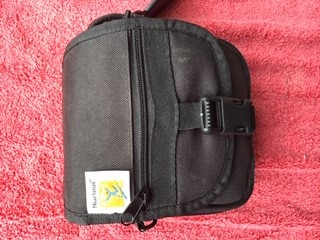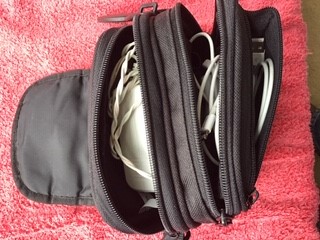Neil K. tells us the story of his journey to cochlear implants, being a passenger on a cruise ship with COVID-19 and how he was prepared with his cochlear implant kit when he had to be hospitalized for COVID-19:
“Being hospitalized as a deaf person, or a deaf person relying on a cochlear implant, can be a daunting experience in any routine or emergency situation. Going through that recently while both my wife and I were in isolation and care with the coronavirus was really tough.
Let me back up. I’m 69 years old and have had my cochlear implant since early 2002. I had a lifelong progressive hearing loss since early childhood. My hearing loss was only moderate to severe most of my life, and I was raised in a hearing environment and mainstreamed throughout all my school years without hearing aids or other devices. I never learned to sign. But progressive hearing loss meant just that. In my 40s, the progression accelerated; I got my first hearing aid and I went through the typical sequence of struggling at work, withdrawal from volunteer activities, reduced social contacts and many symptoms of depression.
Learning about cochlear implants
 It was sometime in the mid-1990s that I began to participate in a hearing loss support group and first met others like myself. It was also there that I first encountered people who had received cochlear implants after sudden hearing loss. I was astounded at how well their cochlear implants helped them. It was not until sometime in 2001 that the approval criteria for adults with my degree of aided hearing loss made me a suitable candidate for a cochlear implant.
It was sometime in the mid-1990s that I began to participate in a hearing loss support group and first met others like myself. It was also there that I first encountered people who had received cochlear implants after sudden hearing loss. I was astounded at how well their cochlear implants helped them. It was not until sometime in 2001 that the approval criteria for adults with my degree of aided hearing loss made me a suitable candidate for a cochlear implant.
I chose Cochlear’s device over the only other brand on the market then because its features best matched my active lifestyle. The flexibility of battery use, various plug in accessories and the option to use it directly with a standard desk phone. I’ve been through various sound processor upgrades over the years and am totally amazed by the steady stream of improvements that have come down the line.
Over the years my cochlear implant has allowed me to be an active advocate for my wife’s various medical situations. Before my cochlear implant, she was my rock of support for my own many trials relating to my terrible hearing. As my hearing improved with my cochlear implant, our roles have reversed and I’ve been able to help her through many medical interactions, surgeries, communications with doctors, pharmacies and so on. Not because she has any hearing issues, but like many people, having a spouse as an advocate can make a huge difference.
Cochlear implants and the cruise ship outbreak
 But now COVID-19 came into our lives. We had been passengers on the ill-fated Grand Princess cruise ship, on which several passengers and crew members were stricken with the coronavirus. When we finally were allowed to dock in Oakland, California, we were sent to quarantine at a local Air Force base.
But now COVID-19 came into our lives. We had been passengers on the ill-fated Grand Princess cruise ship, on which several passengers and crew members were stricken with the coronavirus. When we finally were allowed to dock in Oakland, California, we were sent to quarantine at a local Air Force base.
It was there that we both started to experience the symptoms of the virus. We were sent to a nearby hospital and ended up being admitted for care for fevers and pneumonia. Because we were sent to separate isolation rooms on different floors of the hospital, our ability to advocate for each other was lost. In the chaos of the coronavirus gridlock in the hospital, and for safety of hospital personnel, there was no chance of getting hearing loss accommodation services.
Advocating for myself during this time
While I could work out an arrangement with my own care team to write notes to me when my sound processor was off, the normal method of using the hospital bed phone to ask for help, when needed, was impossible as the phones were not at all compatible with the sound processor’s microphones. That also made it impossible for my wife to call me from her room, as the bedside phone system did not allow calls to my cellphone number. When my own nurses caught on to my problem, they often called my cell number to communicate with me, as they had to restrict the number of times they entered my room due to isolation rules and the necessity to wear single-use only personal protective equipment.
Figuring out how to advocate for my wife, from afar
 My primary concern through all of this was to be able to communicate with my wife’s care team of doctors and nurses. Being isolated separately and being deaf without my sound processor on at night was frightening, to say the least. Eventually I was able to get my wife’s doctors to call my cell too. We even had a couple of, let’s say vigorous and loud telephone exchanges, as I did my best to explain my wife’s current symptoms versus her pre-coronavirus state. This at least spurred them into doing more extensive testing and examination.
My primary concern through all of this was to be able to communicate with my wife’s care team of doctors and nurses. Being isolated separately and being deaf without my sound processor on at night was frightening, to say the least. Eventually I was able to get my wife’s doctors to call my cell too. We even had a couple of, let’s say vigorous and loud telephone exchanges, as I did my best to explain my wife’s current symptoms versus her pre-coronavirus state. This at least spurred them into doing more extensive testing and examination.
My cochlear travel/emergency grab and go bag
 Because we had been on the cruise preceding all of this, I was fortunate enough to have my own cochlear travel/emergency grab and go bag with me in the hospital room. This enabled me to keep my battery charger plugged in and got me through the five days in the hospital. It also helped to have my cellphone charging cable there too. Sometimes hospital staff will, as a courtesy, charge your phone at a nurse-station, but the coronavirus care rules prohibited removing and returning any items from the isolation rooms.
Because we had been on the cruise preceding all of this, I was fortunate enough to have my own cochlear travel/emergency grab and go bag with me in the hospital room. This enabled me to keep my battery charger plugged in and got me through the five days in the hospital. It also helped to have my cellphone charging cable there too. Sometimes hospital staff will, as a courtesy, charge your phone at a nurse-station, but the coronavirus care rules prohibited removing and returning any items from the isolation rooms.
For my travel/emergency pack, I use a canvas storage pack that Cochlear Americas once provided with one of my cochlear implant sound processor model purchases. It has multiple compartments in which I store an extra Cochlear™ Nucleus® 6 battery recharger and power pack, charging cables for my phone and iPad®1, extra hearing aid batteries for my non-cochlear implant side, a disposable battery holder for my Nucleus 6 Sound Processor and some cochlear implant battery packs.
The only thing that does not fit in this pack is the extension cord I also bring along on vacation travel. The pack is always on top of my bureau, ready to be grabbed at a moment’s notice in an emergency situation. When traveling, it’s always in my carry-on luggage. The investment in the extra equipment I keep in the pack has been well worth it to me for the security of knowing I will not be without hearing and the ability to communicate in emergency situations.
My wife and I were extremely lucky to have received early and comprehensive care from our fantastic medical care teams. We were well recovered from all symptoms and in another quarantine facility before we received our positive test results eight days after entering the hospital. Back together and home now, we feel very fortunate to have come through this as well as we did. And as tough as it can be to be a deaf person in the hospital, with no chance for reasonable accommodations under isolation conditions, I’m so thankful that I was able to use my cochlear implant to do my best to advocate for both of us.”
Get updates and helpful advice on our COIVD-19 page here.